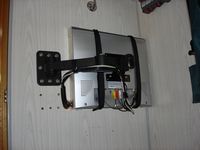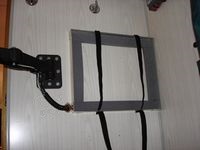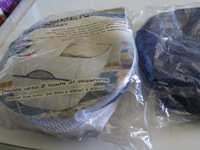Australia So Much to See


Many more hints to help you travel easily and safely
Linen and clothing: Two sets of sheets and two sets of towels are adequate, plus a few old towels as floor mats and for use
as rags. Three changes of each of summer and winter clothing will see most people through their trip in all climates. However a few extra undies and socks won’t add much weight or take up must room. Shoes can be heavy, so limit these.
Electronics: We have an LCD television and a DVD player but hardly ever use them when holidaying. Those travelling with
satellite dishes and decoders have even more weight. Your choice will be based on your needs as to whether you have these entertainment
items when travelling. Most of my electronic equipment takes rechargeable AA and AAA batteries and one small charger does both
types, with option of 12 volt cigarette plug connection or 240 volt. These are for cameras, torches, GPS, hand held two ways
and kitchen clock. This is a saving on number of batteries carried as well. You may need an inverter for running some
small 240 volt appliances. Certainly battery and phone charging is much quicker on 240 volts through the inverter than on 12
volt. However if you can get everything in 12 volt, don’t fit an inverter. For my laptop I use a 12 volt power supply
which is also more power efficient than using on an inverter. My USB internet modem does not require an additional power source. Day to day backing up photos is done onto USB drives, and periodically photos are backed up onto a terabyte external hard drive
which does require 240 volt so can be done on days when in a powered site or using our inverter. LCD television is lighter than
a bulky CRT (vacuum tube) set and more durable for travel.
Tools ands spare parts are weighty items which may be
essential when going into remote areas. Where possible, keep these in the tow vehicle, but they will of course add to the overall
weight of your combined rig which may be an issue and will still add to your fuel consumption. Look for lighter weight alternative
tools even if they will do the job slower. After all, they are only there for a possible unforeseen breakdown anyway.
Annex walls and floor can add more weight and unless staying in one place for a week or so, many do not set up their annex. A wind out awning is a good substitute if you don’t need the annex as an extra room for family. Otherwise leave the walls and floor behind, and just use the roll out as an awning.
Books, be they for leisure reading, or maps and travel information books, are heavy. For leisure reading, use an e-reader. Maps can be downloaded onto mobile phones, tablets or GPS. It is a good idea to have one basic map book should your electronics let you down.
Although most of our load is unbreakable, we have a few concessions.
We have china coffee mugs which travel in the boxes
they came in (they were received as a gift), with a piece of kitchen sponge placed in the bottom. They have not broken in over
50,000 kilometres of caravan travel, including some notoriously rough and corrugated roads.
Wine or beer glasses can be packed into foam stubby holders. I keep light bulbs for our 240 volt lamp in stubby holders. There are also commercial glass packing systems but I prefer the simple solutions.
Our LCD television is mounted onto an internal wall on a multi directional swivel arm, and is held firmly against the wall with Velcro straps, in a aluminium angle frame with foam rubber packing. This has held firm during almost 50,000 kilometres of travel. For those who do not trust leaving the television mounted, tucking it into the bed is safe for most conditions.


Breakable gifts purchased can be wrapped with bubble wrap and preferably stored in small cardboard boxes. Often they can be
purchased in a box, and some stores may bubble wrap for you.
My laptop and computer equipment travel safely in a
laptop bag, and rest on a backward sloping shelf on a piece of foam rubber.
With these precautions, despite thousands
of kilometres of travel on corrugated roads, we have had no breakages of any other above mentioned items.
This idea can be of assistance for novices, or ladies like me who really have to concentrate to get the caravan or trailer to cooperate. You know - you want the trailer to turn left, so you need to turn the steering wheel to the right? Defies your instincts doesn’t
it?
Solution: Place your hands on the lower half of the steering wheel – now when you want to turn the trailer to
the right, it is “right hand up” to turn to the right instead of “left hand down”.
Still confused? I usually am, unless there is no-one watching. Treat the trailer like a contrary person. It starts swinging to the left when you need it to go right – turn the wheel a little to the left i.e. “left hand down” to confront it. It will straighten up at swing in your desired direction. Do not over steer when backing. A few days of practive wil have you backing your caravan with confidence.
However, if you have not had a good deal of experience towing something the size of your caravan or camper,
before starting out towing the laden van on the highways, enrol in a towing course and get to know how your rig will behave while in
a controlled environment.
In the kitchen, make a compromise and use plastic, bamboo or lightweight crockery, and lightweight cutlery. Cater just
for yourselves. Guests can bring their own cups or glasses. Heavy electric appliances such as microwave, toaster, frying
pan, kettle and outdoor gas barbecue are also bulky and generally not necessary. Your lightweight cookware will do the
job on the gas stove. We even use silicon bake ware for bread and cakes as it is lightweight, rattle proof and unbreakable. I save lightweight plastic jars to use as canisters, with a preference for square or rectangular containers rather then round containers.
Food: While bearing in mind the need to carry an emergency supply in case of a breakdown or road closure, in most cases there
is no need to take food for your entire trip. It may be more economical in the long run to purchase at higher cost in the towns
you visit when you consider the costs of carrying a heavy load. These may be as obvious as higher fuel consumption, or more
obscure such as more wear and tear on your rig and a higher chance of breakages such as springs or axles. Dried food is lighter
than canned food, however if this means carrying more water it is not an economy. If you know that water supply will not be
a problem, take more dried foods than heavier wet foods.
Many caravanners will find themselves over the payload limit for their caravan. You will not only be legal and safer but you will use less fuel by lightening the load. Essentials such as water, gas and batteries are all part of your load. Weight distribution is also critical to a safe and stable trailer.
A few hints for reducing weight.
Carrying extra fuel just to save purchasing at more expensive remote outlets may again be false economy. Considering the total
cost of your rig and the high cost of travelling in general, a few more dollars each fuel tank fill will not be significant. Extra fuel of course may be needed for more remote travel.
